Table of Contents
Board of Secondary Education (BSE), Odisha has released the syllabus of the Odisha Teacher Eligibility Test (OTET). The candidates who want to appear for the OTET Exam 2025 must go through the Odisha TET Syllabus with precision. This will help them comprehend the OTET Syllabus’s vastness and the Exam Pattern’s intricacies. Candidates must check out the OTET Syllabus and start preparing for the OTET Exam 2025 for better results.
Odisha TET Syllabus 2025
The Odisha TET Syllabus is available in the following article in detail. The Odisha TET Syllabus for Paper I and Paper II with a detailed explanation of the Odisha TET Exam Pattern and Marks distribution is also given below. The candidates must read the Odisha TET Syllabus, Exam Pattern and Marks distribution for a better understanding of the nuances and new changes introduced by BSEO recently.
OTET Syllabus 2025
The Odisha Teacher Eligibility Test (OTET) syllabus for 2025 is designed to assess the teaching aptitude and subject knowledge of candidates aspiring to become teachers in Odisha. The syllabus is divided into two papers: Paper I for candidates intending to teach Classes I-V, and Paper II for Classes VI-VIII. Both papers cover subjects like Child Development and Pedagogy, Language I (Odia), Language II (English), Mathematics, and Environmental Studies for Paper I, while Paper II includes Mathematics and Science or Social Studies. The syllabus emphasizes understanding child psychology, educational theories, and practical teaching methodologies, ensuring candidates are well-prepared for effective teaching.
Candidates may read all the important highlights of the OTET Syllabus 2025. The OTET syllabus is divided into two sections Paper 1 and Paper 2. Paper 1 is for Class I to V teachers and Paper 2 is for Class VI to VIII teachers.
| OTET Syllabus 2025 | |
| Exam Name | OTET (Odisha Teacher Eligibility Test) 2025 |
| Conducting Body | Board of Secondary Education (BSE), Odisha |
| Exam Level | State |
| Exam Mode | Offline |
| Exam Duration | 150 minutes |
| Exam Purpose | To shortlist candidates for appointment as teachers in schools of Odisha |
| Category | Result |
| OTET Official Website | http://www.bseodisha.ac.in/ |
OTET Exam Pattern 2025
OTET exam pattern 2025 is prescribed by the BSE Odisha Odisha TET exam pattern differs for Primary & upper primary classes. OTET Exam duration is 2½ hours for each paper. Here we are sharing some important pointers regarding OTET Syllabus & Exam Pattern.
(I) There shall be two papers of the OTET viz- Paper-I and Paper-II.
(II) Total duration of the test in each paper shall be 2½ hours.
(III) All questions will be Multiple Choice Questions (MCQ), each carrying one mark with four alternatives out of which one answer is correct.
(IV) The question papers in non-language subjects shall be bilingual i.e. in Odia and English.
(V) Following languages shall be offered in Language – I:- Odia, Hindi, Telugu,
Urdu, Bengali. The candidate has to choose any one of the above languages for the Language-I subject.
(VI) Language-II subject shall be English for all candidates.
(VII) There shall be no negative marking
OTET Exam Syllabus 2025 for Paper 1
In the Odisha TET exam pattern for 2025, Paper 1 consists of a total of 150 multiple-choice questions that must be completed in a duration of 2.5 hours. For further clarification, candidates can refer to the table below:
| Subjects | No. Of Questions | Marks |
| Child Development & Pedagogy | 30 | 30 |
| Language-I (Odia/ Urdu/ Hindi/ Telugu/ Bengali) | 30 | 30 |
| Language-II (English) | 30 | 30 |
| Mathematics | 30 | 30 |
| Environment Studies | 30 | 30 |
| Total | 150 | 150 |
OTET Exam Pattern 2025 for Paper 2
In OTET exam pattern for Paper 2 is such that the question paper will contain a total of 150 objective-type multiple-choice questions. The duration of the exam will be 2.5 hours.
| Subjects | No. Of Questions | Marks |
| Child Development & Pedagogy | 30 | 30 |
| Language-I (Odia/ Urdu/ Hindi/ Telugu/ Bengali) | 30 | 30 |
| Language II (English) | 30 | 30 |
| Mathematics & Science | 60 (30 questions from Mathematics and 30 questions from Science) | 60 |
| Social Studies | 60 (30 questions from History as well as Political Science and 30 questions from Geography) | 60 |
OTET Syllabus 2024 For PAPER – I
The Odisha Teacher Eligibility Test (OTET) syllabus encompasses a wide array of subjects crucial for aspiring teachers in Odisha. It is divided into several sections, including Child Development and Pedagogy, Language (Odia/Urdu/Hindi/Telugu/Bengali), English, Mathematics, and Environmental Studies. Each section is meticulously designed to ensure candidates gain a comprehensive understanding of educational principles, teaching methodologies, and subject-specific knowledge essential for successful classroom instruction.
SECTION – A: CHILD DEVELOPMENT AND PEDAGOGY
Unit – 1: – Understanding Child Development during Childhood (focus on children at the primary level)
- Concepts, principles and Stages of child development
- Characteristics of Physical, cognitive, social, emotional and moral development in Childhood
- Influence of Heredity and Environment in Understanding the Child
Unit – 2: – Understanding Learning Process and Learners
- Learning – concept, nature and individual differences in learning
- Understanding how a child learns – learning through observation, imitation
- The understanding low child learns – various methods of learning
- Basic conditions of learning and promotion of learning through motivation, classroom learning environment and teacher behaviour
- Development of creative thinking
Unit – 3: – Concept of Inclusive Education and Understanding Children with Special needs
- Concept of inclusive education
- Addressing the needs of a diverse group of learning in the inclusive classrooms (CWSN, girls, SC / ST)
- Addressing the talented, creative learning
Unit – 4: – Approaches to Teaching and Learning
- Teacher-centred, learner-centred and learning-centred approach
- A competency-based and activity-based approach
- TLM – its importance, use and preparation for classroom transaction
- Teaching competency to handle mono-grade and multi-grade situations
Unit – 5: – Assessment
- Continuous and comprehensive assessment
- Purpose of assessment
- Assessing scholastic and other scholastic areas
- Sharing of assessment outcomes and follow up
Section Language B (ODIA/ URDU/ HINDI/ TELUGU/ BENGALI)
GROUP – A : (PEDAGOGY)
Unit – 1: – Learning Odia / Urdu / Hindi / Telugu / Bengali at the elementary level
- Aims and objectives of teaching Odia / Urdu / Hindi / Telugu / Bengali as mother tongue
- Principles of language teaching
- Acquisition of four-fold language skills in Odia / Urdu / Hindi / Telugu / Bengali viz., listening, speaking, reading and writing
- Interdependence of four language skills
- Objectives and strategies for transacting integrated text for the beginners
Unit – 2: – Teaching, Reading and Writing Skills
- The technique of developing intensive and extensive reading skills
- Teaching – learning composition and creative writing
- A critical perspective on the role of grammar in learning the language for communicating ideas in written form
- Challenges of teaching language in a diverse classroom, language difficulties and errors
GROUP – B : (CONTENT)
Unit – 3: – Assessment of learning Odia / Urdu / Hindi / Telugu / Bengali
- Assessment of language comprehension and proficiency: speaking, listening, reading, writing – construction of different types of test items
- Remedial teaching
Unit – 4: – Language items
- Part of speech – Noun, Pronoun, Verb, Adverb, Adjectives, Conjunction
- Formation of words – using prefix and suffix
- Synonyms and antonyms
- Phrases and idioms
Unit – 5: – Language Comprehension
- Reading two unseen passages – one passage from prose and one poem with questions on comprehension, drama, inference, grammar and verbal ability (prose passage may be literary, scientific, narrative or discursive)
SECTION C: LANGUAGE (ENGLISH
GROUP – A : (PEDAGOGY)
Unit – 1: – Learning English at the Elementary Level
- Importance of learning English
- Objectives of learning English (in terms of content and competence specifications)
Unit – 2: – Language Learning
- Principles of language teaching
- Challenges of teaching language in a diverse classroom
Unit – 3: – Skills in Learning English
- Four-fold basic skills of learning viz., listening, speaking, reading and writing: interdependence of skills
- Techniques and activities for developing listening and speaking skills (recitation, storytelling, dialogue)
- Development of reading skills: reading for comprehension, techniques and strategies for teaching, reading (phonic, alphabet, word, sentence and story)
- Development of writing skills – teaching composition
Unit – 4: – Assessment of English
- Assessing language comprehension and proficiency: listening, speaking, reading, writing
GROUP – B : (CONTENT)
Unit – 5: – Comprehension
- Two unseen prose passages (discursive or literary or narrative or scientific) with questions on comprehension, grammar and verbal ability
Unit – 6: – Language items
- Nouns, Adverbs, Verbs, Tense and Time, Preposition, Articles, Adjectives, Prepositions, Punctuation
Section D: Mathematics
GROUP – A : (PEDAGOGY)
Unit – 1: – Mathematics Education in Schools
- Nature of Mathematics (exactness, systematic, patterns, preciseness)
- Aims and Objectives of Teaching Mathematics
- Specific Objectives of Teaching Mathematics
Unit – 2: – Methods and Approaches to Teaching – Learning Mathematics
- Methods: Inductive, deductive, analysis, synthesis, play-way
- Approaches: Constructivist and Activity-based
Unit – 3: – Assessment in Mathematics
- Assessment in Mathematics
- Formal and informal assessment
- Different types of test items
- Planning for remedial and enrichment programme in Mathematics
GROUP – B : (CONTENT)
Unit – 4: – Number System and Operation in Numbers
- Number system (natural, whole, rational, real)
- Fundamental operation on numbers
- Fractional numbers and decimals – operations in fractional numbers and decimals
- Factors and multiples – HCF and LCM
- Percentage and its application
Unit – 5: – Measurement
- Measurement of length, weight, capacity
- Measurement of area and perimeter of rectangle and square
- Measurement of time (concept of am, pm and time interval)
Unit – 6: – Shapes and Spatial Relationship
- Basic geometrical concepts (point, line segment, ray, straight line, angles)
- The geometry of triangles, quadrilaterals and circles
- Symmetry
- Geometrical slides (cube, cuboid, sphere, cylinder cone)
Unit – 7: – Data Handling and Patterns
- Pictography, bar graph, histogram, pie chart
- Interpretation of these graphs
- Patterns in numbers and figures
SECTION E: ENVIRONMENTAL STUDIES (EVS)
GROUP – A : (PEDAGOGY)
Unit – 1: – Concept
- Concept and Significance
- Integration of Science and Social Science
- Aims and objectives of teaching and learning EVS
Unit – 2: – Methods and Approaches
- Basic principles of teaching EVS
- Methods: Survey, Practical Work, discussion, observation, project
- Approaches: Activity-based, theme-based
Unit – 3: – Evaluation in EVS
- Tools and techniques for evaluation learning in EVS
- Diagnostic assessment in EVS
GROUP – B: (CONTENT)
Unit – 4: – Governance
- Local – self, Government – State and Central
- Judiciary
Unit – 5: – Physical Features of Odisha and India
- Landscape
- Climate
- Natural resources
- Agriculture and industry
Unit – 6: – History of Freedom Struggle in India and Odisha
Unit – 7: – Health and Diseases
- Nutritional, elements, balanced diet
- Nutritional, deficiency and diseases
- Waste materials and disposal
- First – aid
- Air and water pollution
Unit – 8: – Internal Systems of the Human Body
- Respiratory, circulatory, digestive and excretory system – structure and parts of plant – structure and function
Unit – 9: – Matter, Force and Energy
- Matter and its properties
- Earth and sky, the effect of rotation and revolution of the earth
- Work and energy
OTET SYLLABUS FOR PAPER – II
OTET Paper II is tailored for candidates seeking to qualify for teaching positions in secondary schools (classes VI to VIII) in Odisha. The syllabus includes a diverse range of subjects and topics crucial for effective teaching at this level, such as Child Development & Pedagogy, Language I (Odia/Urdu/Hindi/Telugu/Bengali), Language II (English), Mathematics, Science, and Social Studies. Each section focuses on various aspects of teaching methodology, curriculum, and subject-specific knowledge essential for prospective teachers.
CHILD DEVELOPMENT AND PEDAGOGY – 30 MARKS
Unit – I: – Child Development (Focus on Upper Primary School Children)
- Features of Physical, Cognitive, Social, Emotional & Moral Development during Pre-adolescence and Adolescence
- Effect of Heredity and Environment on Development
- Needs and Problems of Adolescents
- Individual differences among learners
Unit – II: – Learning
- Learning as meaning-making knowledge and construction
- How children learn – observation, initiation, trial, error, experience
- Learning as a social activity
- Rote learning and meaningful learning
- Factors affecting learning
- Strategies for promoting lessons
- Addressing learners from diverse backgrounds including disadvantaged and deprived
- Addressing the needs of children with learning difficulties and impairment
- Addressing the talented, creative and specially-abled learners
Unit – III: – Curriculum Teaching-Learning Approaches and Evaluation
- Teacher-centred, learner-centred and learning-centred approaches
- Principles of curriculum organization
- Teaching learning aids
- Continuous comprehensive assessment of learning, planning and designing achievement tests, rating scale, checklist
- Test reliability and validity
- Date representation – mean, mode and median and standard deviation
LANGUAGE 1 (ODIA / URDU / HINDI / TELUGU / BENGALI)
30 marks
GROUP A (PEDAGOGY)
Unit – 1: – Learning Odia / Urdu / Hindi / Telugu / Bengali at Upper Primary Level
- Aims and objectives of learning Odia / Urdu / Hindi / Telugu / Bengali as a first language
- Principles of teaching mother tongue
- Development of language skills (speaking, reading, writing and listening)
Unit – 2: – Teaching Language
- Intensive and Extensive reading skills at the upper primary level
- The teaching of non-detailed and detailed texts (prose, poetry)
- The teaching of composition and creative writing
- Teaching of grammar
- Challenges of teaching Odia / Urdu / Hindi / Telugu / Bengali in multilingual context
Unit – 3: – Assessment of Language
- Assessment of learning Odia / Urdu / Hindi / Telugu / Bengali language – listening, speaking, reading and writing
- Planning and designing achievement tests and other tools for assessment
GROUP B (CONTENT)
Unit – 4: – Elements of Odia / Urdu / Hindi / Telugu / Bengali Language
- Comprehension of two unseen passages (one from prose/drama and the other from the poem) with test items on comprehension, vocabulary and grammar.
Unit – 5: – Language Items
- Parts of speech (noun, pronoun, verb, adverb, adjectives, conjunction)
- Formation of words (pre-fix and suffix)
- Vocabulary (spelling and meaning of synonyms and antonyms)
- Phrases and idioms
Unit – 6: – Contribution of famous literates for the development of Odia / Urdu / Hindi / Telugu / Bengali language
- Odia – Fakir Mohan Senapati, Gangadhar Meher, Radhanath Ray, Surendra Mohanty, Gopinath Mohanty
- Urdu – Altaf Hussain Hali, Niaz Fatepuri, Ali Sardar Jafri, Amir Khusroo, Majrooh Sultanpuri
- Hindi – Bharatendu Harischandra, Mahavir Prasad Dwivedy, Prem Chand, Jayashankar Prasad, Suryakanta Tripathy Nirala
- Bengali – Rabindra Nath Tagore, Sarat Chandra Chattopadhyay, Tarasankar Bandopadhyay, Kazi Nazrul Islam, Bibhuti Bhusan Bandopadhyay
- Telugu – Srinanthadu, Gurajuda Appa Rao, Kandukuri Veeresalingam, Arudra, C. Narayan Reddy
LANGUAGE II (ENGLISH) 30 MARKS
GROUP A (PEDAGOGY)
Unit – 1: – Learning English at Upper Primary Level
- Importance of learning English
- The objective of learning English
Unit – 2: – Development of English Language Skills
- Basic skills of language (listening, speaking, reading, writing), the interdependence of skills
- The teaching of prose, poetry and composition
- The teaching of creative writing
- Principles of language teaching
- Challenges of teaching English as a second language at the upper primary level
Unit – 3: – Assessment of Learning the English Language
- Assessment of comprehension and language skills (listening, speaking, reading and writing)
GROUP B (CONTENT)
Unit – 4: – Comprehension
- Two unseen passages (one from prose/drama and another from poem) with questions on comprehension, grammar)
Unit – 5: – Language Items
- Parts of speech, tense, voice change and change of narration, use of an article, use of punctuation mark
- Vocabulary – meaning and spelling
MATHEMATICS (ONLY FOR MATHEMATICS AND SCIENCE TEACHERS)
GROUP A (PEDAGOGY)
Unit – 1: – Mathematics at Upper Primary Stage
- Nature of Mathematics – logical, systematic, abstractions, pattern, mathematical language
- Aims and Objectives of teaching Mathematics
- Specific objectives of Teaching Mathematics
Unit – 2: – Methods and Approaches to Teaching – Learning Mathematics
- Methods: induction, deduction, analysis and synthesis
- Approaches: Constructivist and activity-based
Unit – 3: – Evaluation in Mathematics
- Formal and informal evaluation
- Error analysis
- Remedial and enrichment programmes
GROUP B (CONTENT)
Unit – 4: – Number System
- Number System (focus on real and rational numbers)
- Properties in different number systems
Unit – 5: – Algebra
- Basic concepts: terms, coefficient, powers
- Algebraic equations and their applications (with one variable)
- Polynomials – operations in polynomials
- Laws of indices
- Identities
Unit – 6: – Commercial Arithmetic
- Percentage and its application (profit and loss, simple and compound, interest, banking, rebate)
- Ratio and proportion
- Variation and its application
- Square, square root, cube, cube root of natural numbers
Unit – 7: – Shapes and Spatial Relationship
- Triangles and Quadrilaterals
- Angles, complementary and supplementary angles, opposite angles, exterior angles of the triangle
- Angle sum property
- Parallel lines and properties relating to parallel lines
- Congruency and similarities
- Menstruations (area and circumference of circle, higher-order problems relating to area of square, triangle, rectangle, parallelogram, trapezium, Pythagorean theorem)
SCIENCE
GROUP A (PEDAGOGY)
Unit – 1: – Nature of Science
- Aims and objectives of teaching-learning science at the upper primary stage
Unit – 2: – Methods and Approaches
- Methods: Observation, Experimentation, Discovery, Project and Problem – solving
- Approaches: Integrated approach, constructivists approach
Unit – 3: – Evaluation in Science
- Tools and Techniques for assessing learning in Science
GROUP B (CONTENT)
Unit – 4: – Physical Science
- Metal, non – metal and metalloid
- Elements and compounds
- Symbol, valence and chemical equation
- Acid, base and salt
- The physical and chemical changes in matters
- Force, motion, friction, and pressure in solid, liquid and gases
- Electricity and current chemical effects of electric current
- Refraction and reflection of light
- Solar system and planets
Unit – 5: – Life Science
- Biological adaptation among living beings
- Respiration and transpiration
- Soil and forest resource
- Cell structure and function of cell organelle
- Micro-organisms
- Adolescence in human beings
SOCIAL STUDY (ONLY FOR SOCIAL STUDY TEACHER)
GROUP A (PEDAGOGY)
Unit – 1: – Aims and Objectives of Teaching Social Studies
- Importance of teaching-learning Social Sciences at the upper primary stage
- Aims and Objectives of teaching-learning Social Sciences
- Specific Objectives of teaching-learning Social Science
Unit – 2: – Methods and Approaches
- Methods: Survey, fieldwork/trips, project, group work
- Approaches: Activity-based, theme-based
Unit – 3: – Evaluation in Social Science
- Tools and technique for Assessment of learning in Social Science
- Diagnostic assessment and remedial teaching
GROUP B (CONTENT)
Unit – 4: – History and Political Science
- Methods of historical studies, social, economic and political conditions of the sultanate, Moghul and British period
- Slave, Khiligi, Tughlaq, Lodi Dynasty
- East India Company, British Crown, Impact of British rules, Ancient period, Kharabela, Ashoka
- Soma, Garganga, Surya, fall of Odisha, Odisha under Moghuls
- The nationalist movement in India
- Development of Nationalism and Europe
Unit – 5: – Political Science
- Indian Constitution
- Human Rights
- Governance at the Central, State and Local level
- Political Parties and pressure groups
Unit – 6: – Geography
- Odisha Geography – physical features, climate, agriculture and industry
- Natural resources (land, water, forest and wild animals, minerals)
- Atmosphere, biosphere and hydrosphere
- Earth – crust, internal structure, landscape (hills and mountains, plateau, plains, rivers)
- Temperature zones of the earth
OTET Syllabus PDF
The OTET Syllabus PDF can be downloaded using the link provided below. Candidates can click on the OTET Syllabus Downlink to access the complete Odisha TET Syllabus PDF. Simply click on the download link below to access the complete Odisha TET Syllabus in PDF format. This resource is essential for candidates who want to understand the exam’s scope and prepare effectively.
| OTET Important Links | |
| OTET Syllabus | OTET Previous Year Question Paper |
| OTET Eligibilty Criteria | OTET Exam Date |

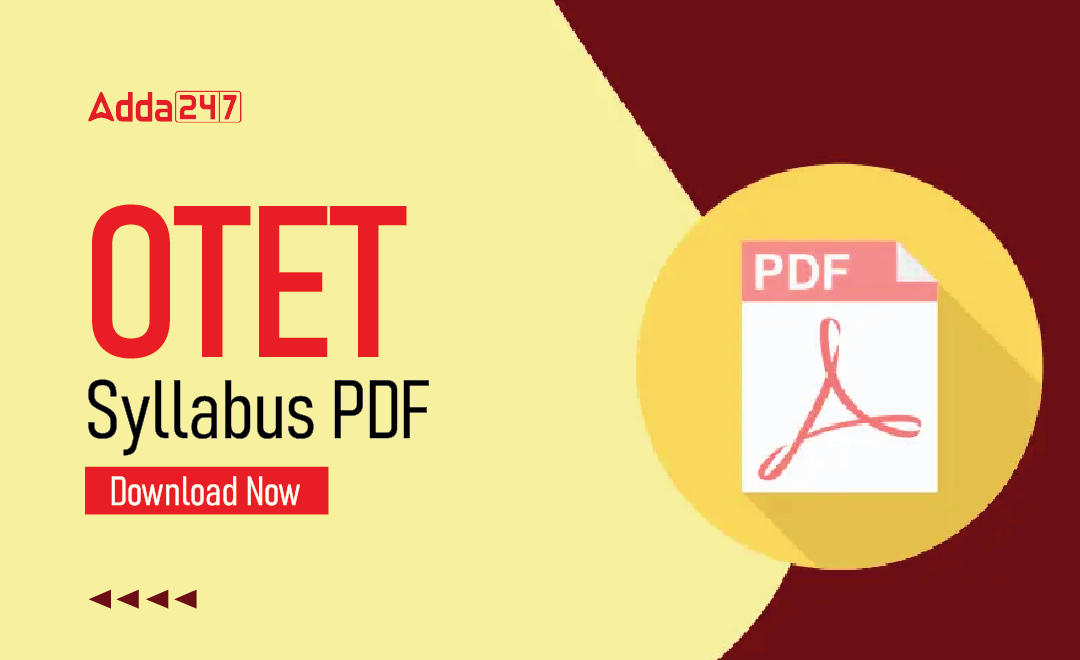
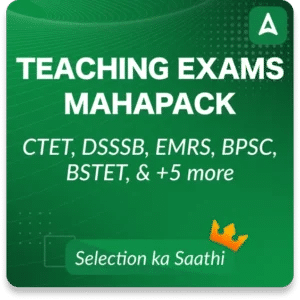

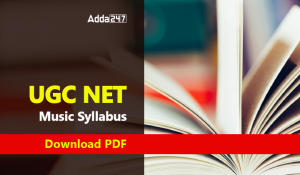 UGC NET Music Syllabus 2025, Download PD...
UGC NET Music Syllabus 2025, Download PD...
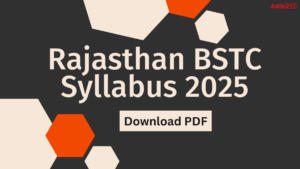 Rajasthan BSTC Syllabus 2025, राज�...
Rajasthan BSTC Syllabus 2025, राज�...
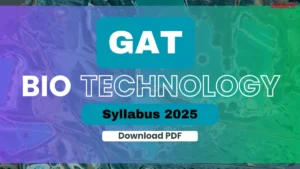 GAT B Syllabus 2025, Check Section-wise ...
GAT B Syllabus 2025, Check Section-wise ...














